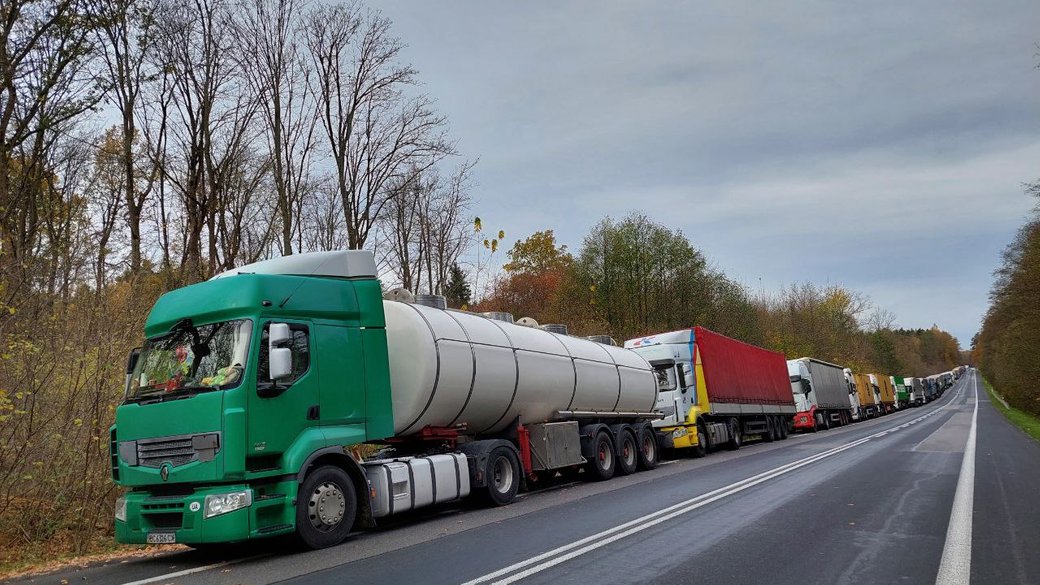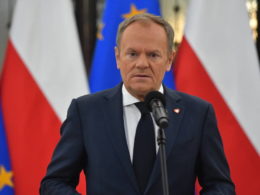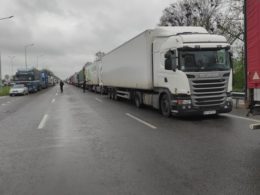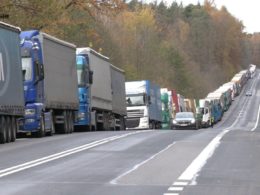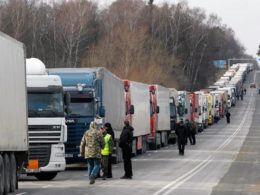On the border with Poland, nearly 3,000 trucks have gathered at three crossing points due to protests by Polish carriers, according to a statement by Andriy Demchenko, the spokesperson for the State Border Guard Service of Ukraine.
As of the morning of November 18, approximately 2,800 freight vehicles were queued up, marking a slight increase compared to the previous day, with the largest congestion at the Krakovets crossing point (around 1,200 trucks), followed by Yahodyn (1,100 trucks), and Rava-Ruska-Khrebenne (500 trucks). D
emchenko also noted that carriers have started choosing alternative routes, leading to congestion at other crossing points, such as Shehyni, where approximately 1,200 trucks are present. He emphasized that passenger cars can freely cross the border, and their movement is not blocked.
This congestion is a result of complications in freight traffic on the Ukrainian-Polish border due to the closure of three crossing points by Polish carriers in the directions of Yahodyn-Dorohusk, Krakovets-Korchova, and Rava-Ruska-Khrebenne. The representatives of Polish truckers, who initiated the blockade, claimed that recent negotiations with Ukrainian officials did not resolve the dispute. The blockade began on November 6 when dozens of Polish carriers started blocking three border crossings with Ukraine.
What preceded:
The border crossing disruptions stem from protests by Polish truck drivers over increased competition from Ukrainian hauliers after a June 2022 agreement removed permit requirements for Ukrainian carriers transiting to the EU. This protest starting on November 6 has blocked three key Poland-Ukraine border crossings, shutting them down or restricting passage into Ukraine.
Previous reports
indicated that on November 9, around 20,000 vehicles were stuck at the border after the Polish trucker protests began. As of November 13, over 1,000 trucks waited at each blocked crossing point, with estimated queue times exceeding 150 hours.
The blockade has severely disrupted transport of Ukrainian exports to the EU. Ukraine has lost its main seaports to Russia's blockade, and now relies heavily on road freight for agricultural and other exports to Europe. With key crossings blocked, hundreds of trucks are stuck waiting to deliver goods. This causes direct losses for Ukrainian businesses unable to fulfill contracts, and risks suspension of production.
Polish businesses are also incurring losses from disrupted trade. Local officials in border towns have advocated ending the protests due to the economic impacts. However, the protesters have support from Poland's anti-Ukrainian Confederation party. The Polish government itself has not endorsed the demands or strike tactics, suggesting this fringe group is acting alone.
Despite Ukrainian officials holding talks with the protesters, recent reports indicate no agreements have been reached yet. The protesters continue demanding the reintroduction of transport permits for Ukrainian carriers. Meanwhile, the blockade has damaged trade and sparked urgent calls for government intervention to prevent further economic losses for both countries.
Both the Ukrainian and Polish governments face mounting urgency to resolve the impasse and resume normal cross-border traffic. However, compromises have proven elusive so far. The EU deal Ukraine signed cannot simply be reversed, as some protesters want. With thousands of trucks still backed up, authorities are under pressure to prevent further trade disruptions that damage both economies.
Related:
- Expert: Immediate lift of border blockade vital for Ukraine-
- Border blockade by Polish drivers "damaging for all,"
- Polish truckers reject Ukraine's compromise offers
- Polish carriers threaten to close all Ukraine border crossings
- Slovak carriers threaten to join Poland in blocking
- Polish carriers block three border crossings with Ukraine
- Critical situation on the Ukrainian-Polish border as

